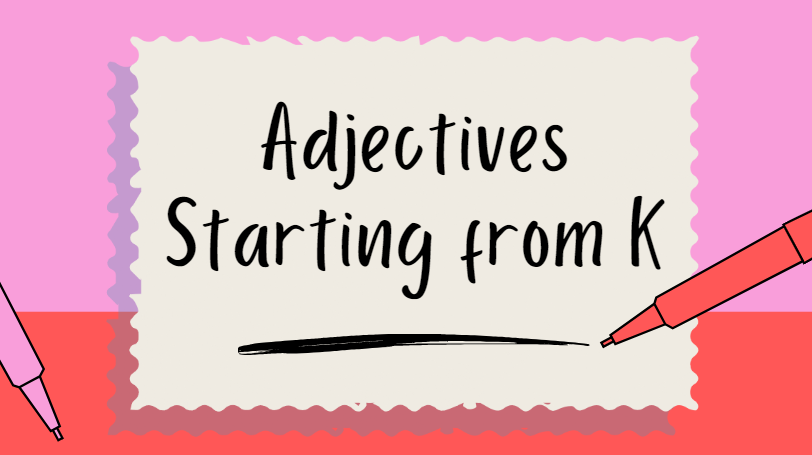Introduction to the Power of Adjectives
Words hold immense power, and adjectives are the secret weapons in our linguistic arsenal. They add flair and depth to our expressions, transforming ordinary sentences into vibrant imagery. When it comes to enhancing your vocabulary, focusing on specific letters can make learning fun and memorable. Today, we’re diving deep into a unique category: adjectives starting from K.
You might be wondering why we should zoom in on this particular letter. Well, apart from being one of the less common letters in English, words that start with K often carry intriguing meanings and can bring freshness to your writing. Whether you’re a student trying to impress your teachers or a professional aiming for eloquence in communication, mastering these adjectives will set you apart.
Ready to explore? Let’s unlock 20 useful adjectives beginning with K that will enrich your vocabulary like never before!
Why Focus on Adjectives Starting from K?
Adjectives are the vibrant colors in the canvas of language. They add depth and dimension, making our communication richer and more engaging.
Focusing on adjectives starting from K might seem niche, but it opens up a world of unique descriptors often overlooked. These words can enhance your writing, giving it a distinctive flair.
Using less common adjectives allows you to stand out. Think about how many times you hear “kind” or “keen.” By incorporating K-adjectives into your vocabulary, you not only diversify your language but also refine your expression.
Additionally, expanding your adjective list is like adding tools to an artist’s kit. The right word can evoke emotions and create vivid imagery that resonates with readers. So why not explore this underused letter? You may discover exciting ways to articulate thoughts beautifully!
List of 20 Useful Adjectives Starting from K
Here’s a selection of 20 adjectives starting from K that can enhance your vocabulary.
Keen: sharp, eager, or enthusiastic about something.
Kind: having a friendly, generous nature toward others.
Kooky: quirky or eccentric in behavior or style.
Knowledgeable: possessing extensive information and understanding on various subjects.
Knotty: complex or intricate; also used to describe tangled situations.
Kosher: compliant with Jewish dietary laws but often means legitimate or acceptable in broader contexts.
Knobby: characterized by knobs; irregularly shaped and bumpy.
Kick-ass: impressive or excellent; often used informally for strong impact.
Kid-friendly: suitable for children, safe and enjoyable for younger audiences.
Keyed-up: anxious, excited, or nervous about something upcoming.
Kaput: broken beyond repair; completely out of order.
Kinetic: related to movement; dynamic energy at play.
Krabby (or crabby): irritable and cranky in mood—often humorously so.
Knockout : exceptionally attractive or impressive person/thing.
Keystone : crucial element that supports an entire structure idea/concept.
Kinesthetic : relating to physical movement/tactile learning experiences.
Knightly : honorable qualities akin to those associated with knights.
Klutzy : clumsy; prone to accidents due lack coordination skills/movement gracefulness.
Kaotic (chaotic) chaotic unpredictability creates confusion disorderly environments situations!
Examples of Using Adjectives Starting from K in Sentences
Using adjectives effectively can bring life to your sentences. Here are some practical examples of adjectives starting from K.
The kitten played with a keen interest in the colorful yarn.
She wore a kilted skirt that danced with every step she took.
His kindness radiated through his warm smile, making everyone feel welcome.
They explored the kaleidoscopic garden filled with vibrant flowers.
Her knowledge was vast, making her an invaluable resource for the team.
He had a knack for solving complex problems quickly and efficiently.
The kids were excited about their upcoming kayaking trip on the lake.
Each example highlights how these descriptive words enhance clarity and imagery in writing. By using them thoughtfully, you create stronger connections with your audience.
Tips for Incorporating Adjectives into Your Writing
Incorporating adjectives into your writing can bring it to life. Start by identifying the core message or emotion you want to convey.
Next, select adjectives that enhance clarity. Instead of saying “the cat,” try “the curious cat.” This paints a vivid picture for your readers.
Variety is key. Use a mix of common and unique adjectives to keep your text engaging. Experiment with different forms and styles to find what resonates best with your audience.
Be mindful not to overdo it; too many adjectives can overwhelm the reader. Aim for balance in each sentence.
Reading widely can also inspire you. Notice how skilled writers utilize descriptors effectively in their work, then adapt those techniques into your own style.
Practice makes perfect! Challenge yourself to use new adjectives regularly until they become second nature in your writing process.
Challenge Yourself to Use Adjectives Starting from K
Challenge yourself to incorporate adjectives starting from K into your daily conversations and writing. This can spark creativity and enhance your language skills.
Try describing people, places, or experiences with these unique words. Instead of saying “the cat is cute,” you might say “the kitten is keen.” It adds flair to your descriptions and engages your audience more effectively.
Set a goal for yourself: use at least three adjectives beginning with K in a single paragraph or dialogue. You could write about anything—a day at the park or an exciting book you read recently.
You’ll be surprised by how natural it feels after some practice. Embrace this fun challenge and watch as your vocabulary flourishes. Keep track of new sentences you create; they may inspire even more innovative ways to express ideas.
Conclusion
Expanding your vocabulary is a rewarding journey. By focusing on adjectives, you enhance your writing and communication skills significantly. Adjectives starting from K may seem limited, but they add unique flair to your descriptions.
Using this list of K adjectives can help you express ideas more vividly. The examples demonstrate how these words create strong imagery and evoke emotions in readers. Practice incorporating them into everyday conversations or written pieces.
Challenge yourself by setting a goal to use at least five new adjectives each week. Gradually, you’ll notice an improvement in the richness of your language.
Remember, every word has the power to convey meaning and emotion effectively. Embrace the challenge of using lesser-known letters like K for broader expression in your writing journey. With time and practice, you’ll unlock new dimensions in your vocabulary that will captivate others with ease.








